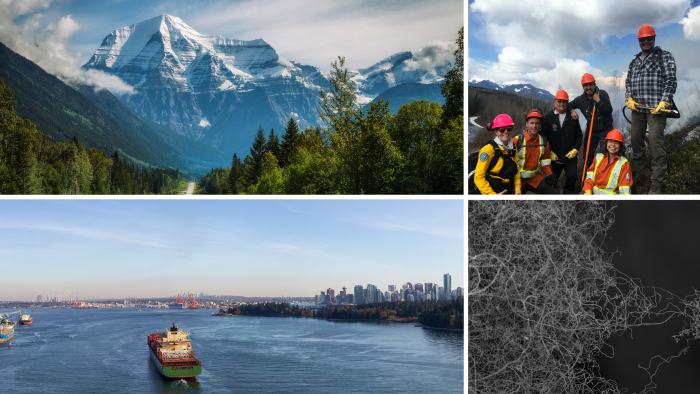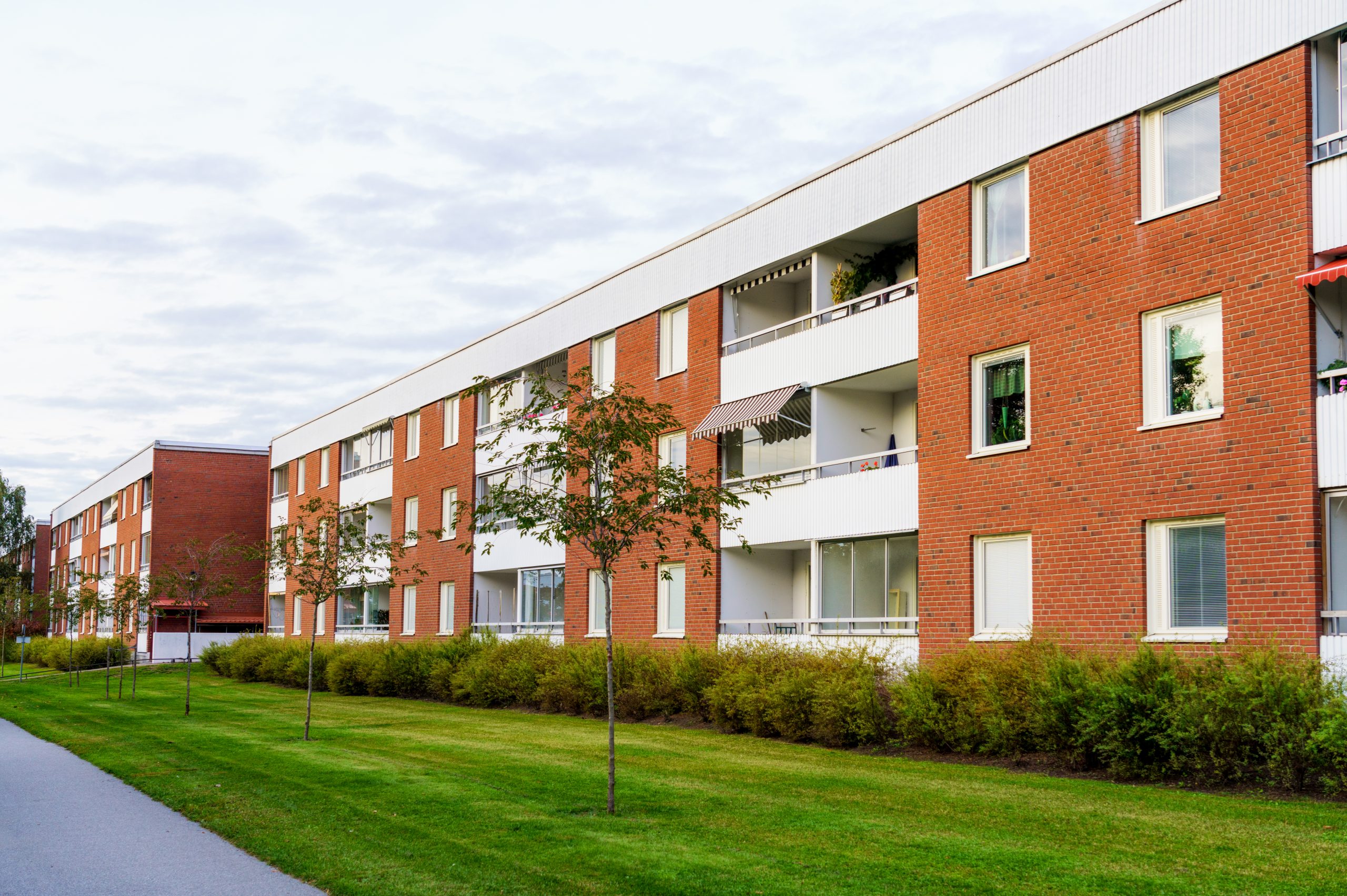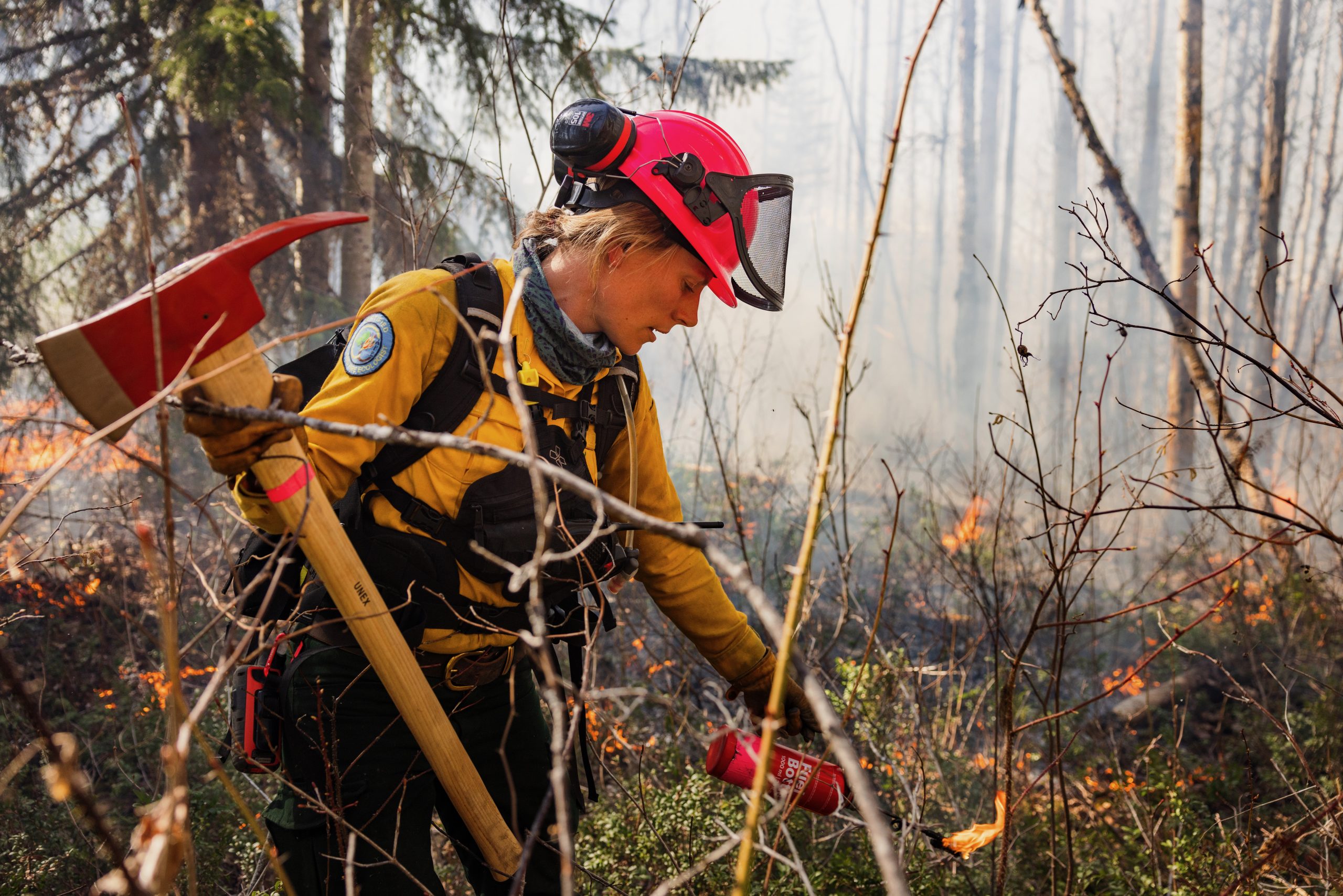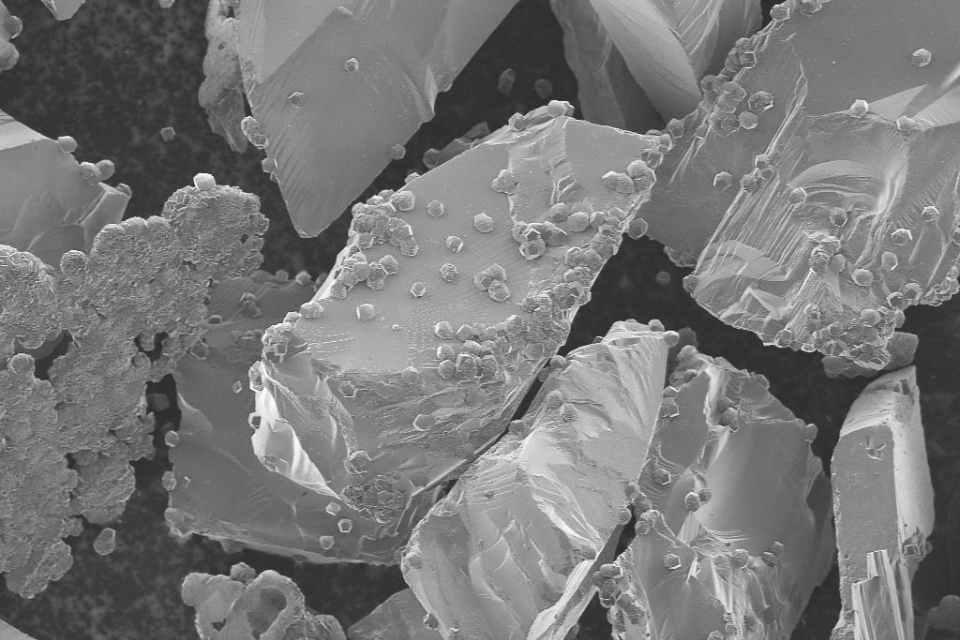
Cooling with Trees: Urban Tree Solutions for Tempering Climate Extremes
Cooling with Trees will demonstrate how urban planners can use trees to bring down the temperature in neighbourhoods.
Concrete, asphalt and vehicle emissions combine to create urban heat islands. But trees have been shown to reduce the urban surface temperature through shading, evapotranspiration (water being transferred from the land to the atmosphere) and the channeling of air currents.
Researchers will work with the City of Vancouver to experiment with various types of soil and tree planting practices to find the ideal combination to boost trees’ benefits to the local climate and to society.
Researchers: Caterina Valeo, C. Peter Constabel, Rishi Gupta , Phalguni Mukhopadhyaya, Jianxun (Jennifer) He, Angus Chu. Project partner: City of Vancouver. Universities: University of Victoria, University of Calgary.
Quotes:
Caterina Valeo, principal investigator, professor of mechanical engineering, University of Victoria:
“We want climate change to have zero impact in terms of any increase of the urban heat island effect. So anything that climate change does to make Vancouver hotter, we want to nullify that. If we could get towards the elimination of the heat island effect with these technologies, this infrastructure — that’s the ultimate goal.”
Sylvie Spraakman, project partner, senior water resources engineer, City of Vancouver:
“We’re having challenges in meeting our targets for improving stormwater quality and planting trees to mitigate heat at the City of Vancouver. One big challenge we run into is that the City of Vancouver is already very developed and it’s difficult to find the space to plant new trees. Trees are seen as the ‘nice to have’ and not the ‘absolutely necessary’.
“I’m excited to see how this will further our work in reducing urban heat island effects in Vancouver.”
Read more: https://climatesolutions.ca/projects/cooling-trees-urban-tree-solutions-tempering-climate-extremes
Safe Passage: BC Green Shipping Corridors Assessment
An international movement has been building to create green shipping corridors — zero-emissions maritime shipping routes between two or more ports — as key to accelerating the decarbonization of the global shipping sector. This project will establish foundational research that will help the shipping industry make informed decisions to speed decarbonization.
This project is supported by Zero-Emission Vehicles Project funding from the British Columbia Ministry of Energy, Mines and Low Carbon Innovation.
Researchers: Curran Crawford, Zuomin Dong. Project partners: Vancouver Maritime Centre for Climate. University: University of Victoria.
Quotes:
Curran Crawford, principal investigator, professor of mechanical engineering, University of Victoria, director, Institute for Integrated Energy Systems:
“This project will contribute to the global discussion of how to decarbonize long-distance shipping. This will coordinate BC and international actors in conversations and research to inform a technology and fuel supply roadmap. The outcome will be an informed plan and insights into where the heavy-duty marine transport segment is evolving to and how BC energy supplies can support and interface with that evolution.”
Elisabeth Charmley, executive director, Vancouver Maritime Centre for Climate:
“A clear understanding of zero- and low-carbon energy sources complemented with an understanding of market demand will lay the foundation to accelerate maritime decarbonization here in our province, which will improve air quality, boost trade and increase investment in BC. There is huge potential in this research.”
Read more: https://climatesolutions.ca/projects/safe-passage-bc-green-shipping-corridors-assessment
Fighting Fire with Food
Overlooked and undervalued for decades, Indigenous fire stewardship, fire-resistant food planting and prescribed burning are re-emerging answers to the threat of wildfires. Lower-intensity burning — known as cultural burning — is a practice that has existed in Indigenous communities since time immemorial, and communities throughout BC are beginning to restore these cultural fire management systems. This project will explore how these traditional resource management practices increase the biodiversity of ecosystems, buffer against a rapidly changing climate and protect cultural, ecological and social values while reducing wildfire risk.
Researchers: Lori Daniels, Kira Hoffman. Project partner: Community of Gitanyow. University: University of British Columbia.
Quotes:
Gitanyow Elder Darlene Vegh:
“Cultural burning to me is a connection with my ancestors, a connection to the spirit world. The smoke sends our prayers to our ancestors — it’s helping connect our DNA to the land.”
“Our ancestors spent thousands of years preparing the land to produce a symbiotic relationship to give us what we needed for food security to survive. We spent 10,000 years preparing our table, our pantry, our food security system — and it only took 150 years for it to disappear.”
Kira Hoffman, postdoctoral researcher, University of British Columbia and Bulkley Valley Research Centre:
“For over 100 years Indigenous fire stewardship techniques such as cultural burning were banned and much of the knowledge and expertise related to burning for plants and medicines has suffered loss. By returning to burning, many food systems and culturally important sites can be restored. This will benefit the community of Gitanyow, but also the plants and animals that they depend on.”
“Through collaboration and braiding of western science and traditional knowledge our team hopes to learn how, when and for what purpose fire was applied to the Lax’yip in the past and how it can be supported again. This project is about restoring Indigenous food systems with fire while mitigating the risks that increasingly severe wildfire poses to the community.”
Lori Daniels, principal investigator, professor, UBC Faculty of Forestry:
“The role of ‘good’ fire for maintaining ecosystem composition, structure and function cannot be understated — it is essential for biodiversity and resilience to climate change.
“This research exemplifies how Indigenous knowledge can lead and guide western scientific research. It requires a long-term commitment to establish a respectful and trusting relationship with Indigenous knowledge holders and community leaders. It also requires true collaboration — sharing our results, co-interpreting their meaning and learning what and how we share the outcomes carefully and respectfully.”
Kevin Koch, Gitanyow Lax’yip Guardians program lead:
“Much of the landscape has been heavily impacted by direct forces, such as silviculture practices that decrease forage productivity for many species and indirect forces related to climate change, such as extreme weather, including drought. Burning will help increase forage values for a wide range of wildlife species which are all interconnected.
“The biodiversity that’s there evolved over thousands of years of fire being a big part of the landscape. When you strip away managed fire, you’re taking away habitat from the species that depend on it. And by stripping away the managed fire, you promote extreme, catastrophic fire. One extreme fire right now could wipe out most of the old growth in the territory.”
Read more: https://climatesolutions.ca/projects/fighting-fire-food
From Waste to Want: CO2 Conversion to Liquid Fuels and Solid Carbon Fibres
This project is working to develop and refine a new process for transforming carbon dioxide and methane into liquid fuels and solid carbon fibres. Over the next three years, researchers will work to better understand and control a catalyst reaction that will capture the carbon needed to create these products — cost effectively converting greenhouse gases into useable products.
Researchers: Chester Upham, Xiaotao Tony Bi. Project partners: Exaer Carbon, Paper Excellence Canada, Catalyst Agri-Innovations Society. University: University of British Columbia.
Quotes:
Chester Upham, a principal investigator and assistant professor of chemical and biological engineering, UBC Faculty of Applied Science:
“Instead of taking crude oil and converting it to gasoline, we’re taking carbon dioxide and methane and converting it to gasoline, which we can then use instead of just releasing it into the atmosphere.”
“We will also be converting CO2 into a solid form. The benefit of that is it’s a saleable product, and you’re not making a product that will release captured CO2 into the air.”
David Garfield, project partner, founder and CEO, Exaer Carbon:
“If you can cost-effectively convert greenhouse gases into products of value, you’re creating a market that could potentially displace trillions of dollars’ worth of industry and billions of tonnes of greenhouse gas emissions globally. You could change the entire materials paradigm.”
“I’m excited to launch this project and think it could be a very fruitful collaboration into the future.”
Davis Chiu, project partner, director of innovation, Paper Excellence Canada, acting head of carbon strategy, Paper Excellence Group:
“Paper Excellence is excited to work with PICS researchers as they develop a process to convert CO2 into sustainable liquid fuels and carbon fibres. We are particularly interested in this technology because pulp and paper mills produce biogenic CO2 when we incinerate bark and lignin to power our mills. This research provides a promising pathway to capture this and use it to produce two items. The technical mill-based information we provide researchers will help ensure the process they develop can be easily used by pulp and paper mills.”
Read more: https://climatesolutions.ca/projects/waste-want-co2-conversion-liquid-fuels-and-solid-carbon-fibres
Mountain Community Adaptation to Changing Snowpacks and Geohazards
Rockfalls, landslides, mudslides and floods are facts of life in British Columbia mountain communities. Vital infrastructure such as roads, rail and telecommunications are particularly vulnerable to hazards, putting entire communities at risk of displacement. As mountain snowpacks change due to climate change, and those changes affect these typical geohazards, how can these communities better prepare for the challenges to come?
This project will connect people and community leaders with information and real-time data to help them adapt to climate change impacts.
Researchers: Joseph Shea, Tristan Pearce. Project partners: Village of Valemount, Regional District of Fraser-Fort George. University: University of Northern British Columbia.
Quotes:
Joseph Shea, project principal investigator, UNBC associate professor, Department of Geography, Earth and Environmental Sciences:
“The project is built around community adaptation and resilience. We’ll be looking at what ways the communities are vulnerable to these geohazards and changing mountain snowpacks. What issues do members of the community and decision-makers in the community see, and how are these expected to change in the future under climate change.”
“We’re going to go to the community: talk to the decision-makers, talk to people who work in the community forests, talk to First Nations who have territories in the area. What do they see as concerns, are there events or incidents that we should know about?”
Owen M. Torgerson, mayor of the Village of Valemount:
“Village of Valemount is grateful for our partners at the Pacific Institute for Climate Solutions and University of Northern of British Columbia. This collaborative approach for identifying and bettering understanding the geo and climate hazards in our region will greatly assist in furthering the village’s efforts for climate adaptation and risk reduction strategies.”
Dannielle Alan, regional district director for the Regional District of Fraser Fort George:
“Once we have the knowledge, we can work to mitigate it. We can share that knowledge so that we can use it in a positive way to help our communities stay healthy, help our agriculture remain viable, and protect our water systems.”
Read more: https://climatesolutions.ca/projects/mountain-community-adaptation-changing-snowpacks-and-geohazards
A media kit containing photos is available on Dropbox.
About the Pacific Institute for Climate Solutions
The Pacific Institute for Climate Solutions is a climate research collaborative institute between its four partner universities — the University of Victoria, Simon Fraser University, the University of British Columbia, and the University of Northern British Columbia — that co-develops and co-delivers climate solutions research and programming with diverse partners across BC and beyond.


